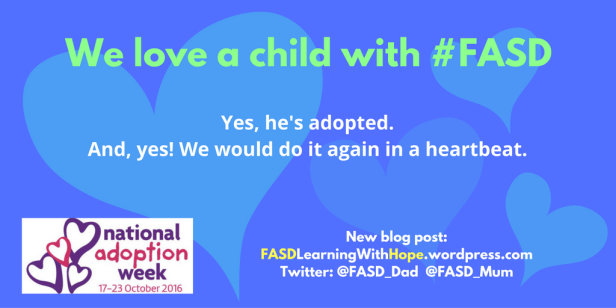 By FASD_Dad
By FASD_Dad
Adoption is an important part of our family story. I was adopted in the UK back in the 1960s. We adopted our son with FASD a decade ago. Whenever we speak publicly about FASD one of the questions we are always asked, in more or less delicate form, is whether we regret adopting our son? Would we have chosen a different child if we had known he had FASD? What it is like for me, having been adopted, to raise an adopted child?
The decision to adopt was made easier for us because my parents did a good job with me. Ignoring the advice of the time, they told me about my adoption from the earliest age. They made sure I always understood I was their son, no different to birth sisters that followed. A genuine part of the family. This was at a time when parents were advised, unbelievably, to hide adoptions to avoid difficulties.
So if we had known our son has FASD, would it have made a difference? This is an important question, all the more so this week. This week is National Adoption Week in the UK. One study showed that in Peterborough as many as 75% of the children available for adoption were exposed to alcohol in the womb. Should those kids, many of whom may have FASD, remain in the care system, denied the stability and life chances a loving family can bring them? Of course not.
My own background meant that the idea of shopping around for the perfect baby was horrifying to me. I couldn’t imagine browsing images of children as if from a mail order catalogue. A child is not a fashion choice. If you have a birth child, you take what fate brings. So it should be with adoption. We had both decided before our first son was born that although my wife was in a very high risk group for delivering a baby with Downs Syndrome, we wouldn’t take the tests. We didn’t need too. He was our baby, part of our family. In the event, our older son was born with no disabilities. But it meant years before we got to adopting our second son, we had considered what it meant to raise a child with a disability and we had decided that we could.
Raising a child with FASD isn’t something to be undertaken lightly, but neither is it something to be avoided. Kids with the condition need a family’s love just like any other child. We didn’t know our son had FASD when we adopted him, he wasn’t diagnosed for another 8 years. But we did know he had major issues, including developmental delays. He was 16 months old and completely silent when he came to us from the children’s home where he had been since birth. He also wasn’t walking – although he very quickly did. We knew there was something. We just didn’t know what. Before we adopted, when we asked the authorities what the something might be their reaction was to offer to find us another child. We said no instantly. We had already fallen in love with our little man, and shopping for the perfect baby wasn’t on the agenda. (Incidentally if you think any child is perfect then adoption may not be for you, at least not until you know a lot more about kids).
So what do we advise? Read a lot. Learn about FASD. Read about the problems your child is likely to have. How school will be difficult. How bedtimes will be really hard. How your child might go from a zero to sixty meltdown in a few seconds – things will fly, people will get hit. Toys and windows may be broken. Friendships will be hard, and the gap with peers will grow as your kid grows. The challenges will not go away. Marriages and other relationships will be strained. Some days may be long, very long. Some of the effects may not be knowable for years.
Don’t go into this wearing rose tinted glasses. Don’t avoid reality. Understand this is lifelong brain damage.
But if after doing all of your research, you feel you are ready, do go into it. Know there are things you can do as a parent to increase this child’s chances for a happy, fulfilling, and successful life. Factor in that your child will bring a huge amount of love into your lives. That their smile will brighten the darkest day. That their achievements will warm your heart and make you proud, especially because they will have worked harder than any kid you know to get there. That they will amaze you with everything they can do. That they will make your family complete and teach you some of the most important life lessons we can learn.
Take your decision carefully. An adoption is a lifetime decision. A child traumatised by early life events, simultaneously living with FASD, would be irreparably damaged by a disrupted adoption. Social workers and others need to be much better informed about FASD, in order to better inform potential adopters. The services and support offered to those adopters need to be much better tailored to children with FASD and the needs of adoptive parents. Information and concerns should be shared by all the officials, not smoothed over or tucked away. No adopter should be blind-sided about this most important decision.
But, all this considered, go along and find out about adoption. See if it will work for you. If the answer is yes, don’t turn a child away just because they have FASD. They need you in their life, and you need them. Your life will be the richer for them.
